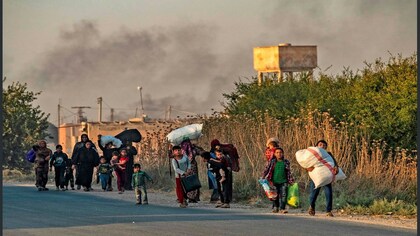For Iran Watchers, Cause for Concern
01:58 - 27 October 2011

The prospect of a U.S. pullout from Iraq at the end of this year is stoking fears among Washington\'s Middle East allies that Iran will profit from a diminished American military presence in the region.
Baghdad\'s political leadership, including Prime Minister Nouri al-Maliki, already has close diplomatic ties with Tehran, and has backed Iran on important regional issues, such as the Organization of Petroleum Exporting Countries\' oil-production quotas and support for embattled Syrian President Bashar al-Assad.
A number of U.S. allies said Washington\'s pullout from Iraq could be seen by Tehran as a green light to intensify its meddling. A common joke from the early days of the U.S. presence in Iraq was that the U.S. spent billions of dollars to invade Iraq only to hand it over to the Iranians on a golden plate.
One worst-case scenario: Iraq could replace the role Syria has played for Iran: a pivotal Arab ally facilitating Iran\'s transfer of funds and arms to proxy groups such as Lebanese Shiite group Hezbollah and Palestinian militant group Hamas.
\" is seen as giving Iraq back to Iran and a sign that the U.S. is less committed to the region,\" said a senior Arab official shortly after President Barack Obama announced the Dec. 31 pullout plan. \"That\'s how it will be read in the region.\"
The Iranian issue has fueled some conservative criticism of Mr. Obama\'s decision. \"Certainly, tonight Supreme Leader Khamenei will dance a jig of celebration,\" said Michael Rubin, a former Pentagon official now at the American Enterprise Institute, a conservative think tank.
It is also possible the final U.S. withdrawal from Iraq could focus Iran\'s gaze elsewhere. The country\'s leadership had prided itself on its ability to destabilize Iraq through Shiite allies such as cleric Moqtada al-Sadr. Analysts say Iran could now turn its attention to Afghanistan, at its eastern border, where over 100,000 U.S. troops remain.
\"Wherever American soldiers are present, that\'s where Iran…will concentrate because they know soldiers are the gateway to putting pressure on the U.S.,\" said Mohsen Sazegara, a founder of Iran\'s elite military unit, the Islamic Revolutionary Guard Corps, who is now a vocal critic of the Iranian regime.
Some supporters of the pullout say the Obama administration\'s hand may be strengthened as it pursues its goal of ending Iran\'s nuclear program, largely through sanctions.
Until now, Iran was able to use its ability to target American forces in Iraq to deter the U.S. and its allies from using military strikes to destroy Tehran\'s nuclear infrastructure.
At the outset of the U.S. military campaign in Iraq, many senior officials in the George W. Bush administration saw the toppling of strongman Saddam Hussein as a vehicle through which to weaken Iran, which fought an eight-year war with Iraq in the 1980s.
They hoped a democratic government in Baghdad could lead to increasing calls among Iranians for an end to their political system, which is dominated by religious clerics. Washington also hoped a new Iraqi government would back the West on issues such as economic reform, energy policy and the need to eliminate weapons of mass destruction.
Iran, however, shorn of a rival with Hussein\'s fall in 2003, moved quickly to extend its influence into Iraq, according to U.S. and Arab officials.
Mr. Maliki and other top Iraqi officials lived in Tehran during much of Hussein\'s tenure and developed close relations with Iranian officials. Iran, which shares the Shiite faith with the majority of Iraqis, has also used religious, commercial and aid institutions to project Iran\'s influence inside Iraq.
U.S. defense officials said the Islamic Revolutionary Guard Corps has accelerated arms shipments to Iraqi Shiite militias in recent months to force the final withdrawal of American troops.
In June, 15 U.S. soldiers were killed in attacks by these militias using rocket-assisted flying projectiles. Iran denies supporting the attacks.
Iranian officials haven\'t yet reacted to the news of the U.S. pullout, but the country\'s intelligence minister touched on the topic when discussing the U.S.\'s allegation, denied by Tehran, that Iran was planning to assassinate Saudi Arabia\'s ambassador to Washington.
\"America has had a series of failures in the Middle East since the Sept. 11 attacks. The U.S. military and intelligence operation in Iraq and Afghanistan has been pathetic and now we see them leaving Iraq with shame,\" said the minister, Heydar Moslehi, on Thursday, according to Iran\'s official news agency.
Source: THE WALL STREET JOURNAL
Baghdad\'s political leadership, including Prime Minister Nouri al-Maliki, already has close diplomatic ties with Tehran, and has backed Iran on important regional issues, such as the Organization of Petroleum Exporting Countries\' oil-production quotas and support for embattled Syrian President Bashar al-Assad.
A number of U.S. allies said Washington\'s pullout from Iraq could be seen by Tehran as a green light to intensify its meddling. A common joke from the early days of the U.S. presence in Iraq was that the U.S. spent billions of dollars to invade Iraq only to hand it over to the Iranians on a golden plate.
One worst-case scenario: Iraq could replace the role Syria has played for Iran: a pivotal Arab ally facilitating Iran\'s transfer of funds and arms to proxy groups such as Lebanese Shiite group Hezbollah and Palestinian militant group Hamas.
\" is seen as giving Iraq back to Iran and a sign that the U.S. is less committed to the region,\" said a senior Arab official shortly after President Barack Obama announced the Dec. 31 pullout plan. \"That\'s how it will be read in the region.\"
The Iranian issue has fueled some conservative criticism of Mr. Obama\'s decision. \"Certainly, tonight Supreme Leader Khamenei will dance a jig of celebration,\" said Michael Rubin, a former Pentagon official now at the American Enterprise Institute, a conservative think tank.
It is also possible the final U.S. withdrawal from Iraq could focus Iran\'s gaze elsewhere. The country\'s leadership had prided itself on its ability to destabilize Iraq through Shiite allies such as cleric Moqtada al-Sadr. Analysts say Iran could now turn its attention to Afghanistan, at its eastern border, where over 100,000 U.S. troops remain.
\"Wherever American soldiers are present, that\'s where Iran…will concentrate because they know soldiers are the gateway to putting pressure on the U.S.,\" said Mohsen Sazegara, a founder of Iran\'s elite military unit, the Islamic Revolutionary Guard Corps, who is now a vocal critic of the Iranian regime.
Some supporters of the pullout say the Obama administration\'s hand may be strengthened as it pursues its goal of ending Iran\'s nuclear program, largely through sanctions.
Until now, Iran was able to use its ability to target American forces in Iraq to deter the U.S. and its allies from using military strikes to destroy Tehran\'s nuclear infrastructure.
At the outset of the U.S. military campaign in Iraq, many senior officials in the George W. Bush administration saw the toppling of strongman Saddam Hussein as a vehicle through which to weaken Iran, which fought an eight-year war with Iraq in the 1980s.
They hoped a democratic government in Baghdad could lead to increasing calls among Iranians for an end to their political system, which is dominated by religious clerics. Washington also hoped a new Iraqi government would back the West on issues such as economic reform, energy policy and the need to eliminate weapons of mass destruction.
Iran, however, shorn of a rival with Hussein\'s fall in 2003, moved quickly to extend its influence into Iraq, according to U.S. and Arab officials.
Mr. Maliki and other top Iraqi officials lived in Tehran during much of Hussein\'s tenure and developed close relations with Iranian officials. Iran, which shares the Shiite faith with the majority of Iraqis, has also used religious, commercial and aid institutions to project Iran\'s influence inside Iraq.
U.S. defense officials said the Islamic Revolutionary Guard Corps has accelerated arms shipments to Iraqi Shiite militias in recent months to force the final withdrawal of American troops.
In June, 15 U.S. soldiers were killed in attacks by these militias using rocket-assisted flying projectiles. Iran denies supporting the attacks.
Iranian officials haven\'t yet reacted to the news of the U.S. pullout, but the country\'s intelligence minister touched on the topic when discussing the U.S.\'s allegation, denied by Tehran, that Iran was planning to assassinate Saudi Arabia\'s ambassador to Washington.
\"America has had a series of failures in the Middle East since the Sept. 11 attacks. The U.S. military and intelligence operation in Iraq and Afghanistan has been pathetic and now we see them leaving Iraq with shame,\" said the minister, Heydar Moslehi, on Thursday, according to Iran\'s official news agency.
Source: THE WALL STREET JOURNAL



